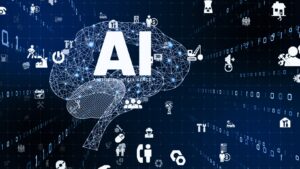Future of AI in Business
Artificial Intelligence (AI) is no longer just a futuristic concept; it’s reshaping the business landscape today. Companies across various industries are leveraging AI to streamline operations, enhance customer experiences, and drive innovation. As technology continues to evolve, AI’s potential in transforming business strategies becomes even more promising.
In the coming years, AI is expected to play a pivotal role in decision-making processes, offering data-driven insights that were once unimaginable. Businesses that embrace this technology will likely gain a competitive edge, as AI tools become more sophisticated and accessible. The integration of AI into business models is not just a trend; it’s a necessity for those aiming to thrive in an ever-changing market.
Current AI-driven applications in business sectors demonstrate transformative capabilities. They include various technological innovations:
- Customer Service Automation: AI-based chatbots, like those used by banks and e-commerce platforms, handle customer inquiries efficiently, reducing response times and operational costs.
- Data Analytics and Insights: Companies utilize AI algorithms to process large datasets, uncover trends, and generate actionable insights. For example, retailers analyze purchasing patterns to optimize inventory management.

- Predictive Maintenance: In manufacturing, AI tools predict equipment failures, helping in reducing downtime and maintaining optimal operational efficiency.
- Fraud Detection: Financial institutions use AI to monitor transactions and detect anomalies in real time. This enhances security by identifying potential fraud patterns.
- Marketing Personalization: AI systems personalize marketing efforts, using consumer data to tailor advertisements and improve user engagement across platforms like Google and Facebook.
- Supply Chain Optimization: Businesses employ AI to forecast demand, optimize routes, and manage logistics, improving overall supply chain efficiency.
- Human Resources: AI streamlines recruitment by sifting through resumes and identifying suitable candidates, speeding up the hiring process. Implementing an efficient applicant tracking system further enhances the process by automating resume screening and candidate management.
These applications illustrate AI’s growing role in enhancing efficiency and innovation across diverse industries.
Emerging AI Trends
AI continues to evolve, impacting business operations and strategies. Emerging trends reveal further integration and innovation across various sectors. Organizations employ machine learning (ML) for complex data analysis, driving more informed decisions. Algorithms become more sophisticated, enabling deeper personalization in customer interactions and better forecasting of business trends.  For instance, recommendation engines use ML to tailor suggestions based on user behavior, enhancing customer satisfaction. Meanwhile, industries like healthcare adopt ML for improved diagnostic accuracy and treatment plans, demonstrating its reach and adaptability.
For instance, recommendation engines use ML to tailor suggestions based on user behavior, enhancing customer satisfaction. Meanwhile, industries like healthcare adopt ML for improved diagnostic accuracy and treatment plans, demonstrating its reach and adaptability.
Robotic process automation (RPA) transforms repetitive tasks across industries, enhancing efficiency and reducing human error. As RPA integrates more with AI, businesses automate complex processes, freeing up human resources for strategic initiatives. Manufacturing benefits from robotics, increasing production speed and precision. Additionally, the retail sector adopts AI-driven robots for inventory management, optimizing supply chain operations. This blending of automation and AI robotics advances operational capabilities and cuts costs.
Potential Benefits of AI in Business
Artificial Intelligence offers several promising benefits for businesses. Companies harness AI to streamline processes, improve accuracy, and drive innovation. AI enhances efficiency by automating routine tasks, freeing employees to focus on more strategic work. In supply chain management, AI-powered systems can optimize inventory management and reduce downtime. Predictive maintenance uses AI to foresee equipment failures before they occur, minimizing operational disruptions.
AI’s data processing capabilities elevate decision-making by providing actionable insights. Businesses can analyze vast datasets quickly, identifying trends and market opportunities. Retailers use AI to personalize customer experiences and forecast demand, aligning inventory with consumer preferences.
AI’s transformative potential in business is undeniable, offering unprecedented opportunities for innovation and efficiency. As companies navigate this evolving landscape, it’s crucial to address ethical concerns and invest in robust cybersecurity measures. By aligning AI with strategic goals and fostering a culture of continuous learning, businesses can harness AI’s full potential. The future of AI in business promises not only enhanced operational capabilities but also the ability to redefine industries. Embracing these advancements will be key to maintaining a competitive edge and achieving long-term success in an increasingly AI-driven world.

